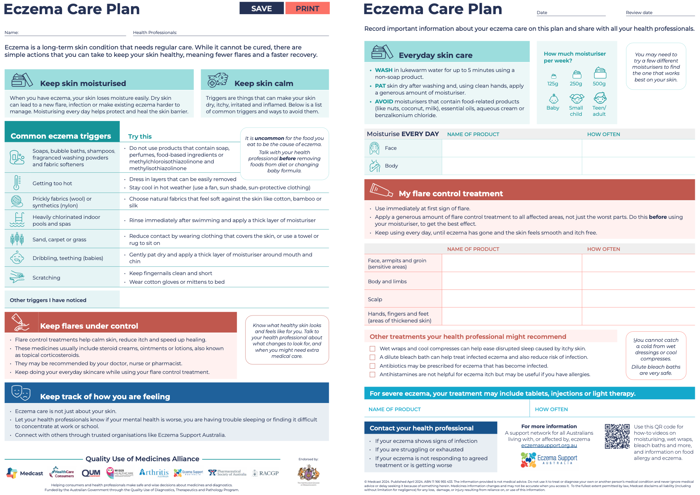Optimising paediatric Eczema Care: A Nurses’ Guide
Eczema, a prevalent chronic skin condition in children, demands careful and informed management to reduce flare-ups and maintain skin health. Understanding the key principles of managing paediatric eczema, enhances both care quality and patient education.
Understanding Eczema and Its Management
Eczema primarily affects the skin's barrier function, leading to dryness and susceptibility to irritants and allergens. Effective management relies on daily skin care routines, trigger avoidance, and the strategic use of medications. Nurses play a crucial role in educating patients and carers about these aspects, ensuring adherence to care plans that mitigate symptoms and improve quality of life.
Daily Skin Care and Trigger Avoidance
Key to eczema management is the application of moisturisers to prevent dryness and protect the skin barrier. A patient-centred care plan should include education for patients, parents and carers on selecting the right products—those free from irritants such as fragrances, certain preservatives, and allergenic components like food-based ingredients. Additionally, wearing appropriate clothing and avoiding known irritants such as harsh soaps and prickly fabrics are crucial steps in preventing flare-ups.
Addressing Common Triggers and Treatment Misconceptions
A significant part of nursing care involves clarifying misconceptions about eczema treatments, particularly the use of topical corticosteroids. It is important to reassure patients about the safety of these treatments when used correctly and to dispel myths associated with their use, such as the mistaken belief that they are inherently harmful. Discussions should also cover the role and safety of diluted bleach baths in the management of infected eczema and in the prevention of recurrent skin infections.
Implementing Eczema Care Plans
An individualised Eczema Care Plan is a vital tool for managing the condition. Utilising a multidisciplinary approach to the implementation of care plans tailored to the patient's needs, including detailed instructions on daily care, trigger management, and the application of treatments during flare-ups improves compliance. Ensuring that patients and their families understand and can execute these plans is fundamental to successful management.
The Quality Use of Medicines Alliance has developed an Eczema Care Plan to support conversations and enhance patients’ confidence to manage eczema.
Educational Support and Mental Health Considerations
There is a psychological impact of eczema on patients and their families. As part of the Eczema Care Plan, it's important to assess and address any related mental health issues, such as stress or sleep disturbances caused by itching. Providing support and resources, such as connections to organisations like Eczema Support Australia, can be incredibly beneficial.
Improving Outcomes
Managing paediatric eczema effectively requires a comprehensive approach that includes education, proper skin care, and psychological support. As nurses, our role is not only to administer treatment but also to empower patients and their families with knowledge and skills to manage eczema proactively. By doing so, we can significantly improve the outcomes and quality of life for our youngest patients.
More on the quality use of medicines
QHUB is Medcast's new dedicated platform for education and resources that support safe and appropriate use of medicines.
Click the logo below to find out more!
Related courses
Practical solutions to paediatric eczema care - Webinar
Virtual Educational Visiting: Free interactive small group learning for your practice

Susan is the Head of Nursing Education for the Medcast Group.
DipAppScNsg, BN, CritCareCert, CoronaryCareCert, TraumaNsgCareCert, CertIV(TAE), MN(Ed), and GradCert(Ldrshp & Mgt).
GP Dr Kate Annear and Clinical Psychologist A/Prof Aliza Werner-Seidler discuss practical strategies for engaging young people, conducting psychosocial assessments, and using lifestyle, social, psychological and digital interventions to support mild to moderate depression and anxiety in young people.
With one in three young Australians experiencing a mental health condition each year, and suicide remaining the leading cause of death for 16 to 24-year-olds, the way clinicians approach antidepressant use in teens and young adults has never been more important.
Discover practical strategies for GPs to identify and manage anxiety and depression in adolescents, balancing non-pharmacological care with thoughtful, evidence-based prescribing when needed. Find out how the Quality Use of Medicines Alliance is helping health professionals navigate this complex area with new clinical tools, national education programs and expert-led insights.





